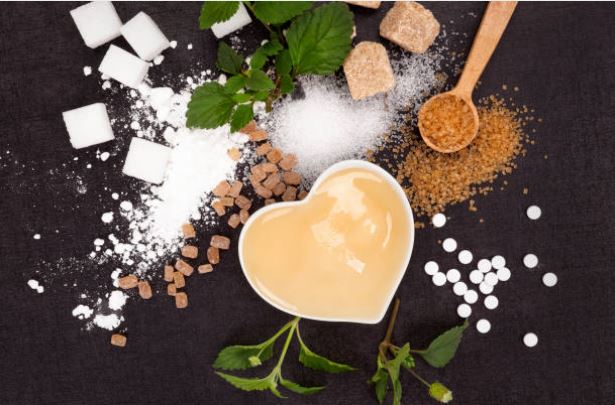


Many people think that sweeteners are good because they are much healthier and kinder to use as far as the health of your teeth is concerned. They don’t cause as many cavities. The other reason people use sweeteners is to lose weight.
There are others who will say no to artificial sweeteners because they reckon they are the precursors to cancer and other nasty diseases. You be the judge.
What really are sweeteners?
When saccharin first came out around the early 1900s, people questioned its use. It was Teddy Roosevelt who said: “Anyone who thinks saccharin is dangerous is an idiot".
Even so, presidents can also be wrong and saccharin still is one of the most studied molecules around today.
After saccharin, two more artificial sweeteners arrived on the market; called aspartame, and acesulfame K. All were created and invested in, to take the place of sucrose.
Saccharin was discovered by a chemistry research assistant, Constantine Fahlberg. He was working on a new food preservative when some of the compound was left on his hands, which he then noticed to be so intently sweet.
He named it saccharin after the Latin word saccharum which means sugar. He went back to his to lab to trace back his steps to be able to synthesize saccharin in bulk.
Where we stand today
Today, we are putting artificial sweeteners in our coffee, we drink them in our diet sodas, and millions use them to cut calories and to hopefully lose weight.
But the question is always asked – are they hazardous to our health? It is a critical question because the average American is consuming around 24 pounds of artificial sweeteners every year!
Apart from sodas where they are commonly found, sugar substitutes are also added to nearly 6,000 other products in the US. You might not have even realized it, but these sweeteners are included in baby foods, yogurts, and frozen dinners.
There are four major groups of FDA-approved artificial sweeteners around. These are:
Is it true that they can actually cause you to gain weight?
There are millions of people who use artificial sweeteners to cut down on their caloric intake. But in fact, the very opposite can occur.
There is new research which shows that artificial sweeteners can stimulate your taste receptors that sense sweetness in your stomach and esophagus. Because the pancreas anticipates energy, it releases insulin, an important hormone in the body which accumulates body fat.
At the same time, chemicals get sent to the brain’s satiety center. The brain becomes confused as to whether or not the body is actually receiving calories when sweeteners are ingested.
The end result is that you feel even hungrier and less full, which can lead to weight gain.
Some people say artificial sweeteners are addictive
Research completed on artificial sweeteners shows that they can affect the same parts of the brain that has to deal with addiction. Artificial sweeteners are substances that some people just cannot do without, a kind of addiction.
They are also much sweeter than natural sugars, such as the sugar found in whole grains, fruits and skim milk – and therefore can actually reset your taste buds.
The body can then build up a tolerance, which in turn can cause overuse – another sign of addiction.
The theory which exists that artificial sweeteners can cause weight gain extends to include even addictive behavior.
This is because the sweet receptors in the esophagus and the stomach become “tricked” into receiving the zero-calorie sugar substitute, making a person crave more food and becoming susceptible to addictive eating habits like binging or overeating.
And some say they cause you to need to the bathroom more often
It is reported that artificial sweeteners can cause you to go to the bathroom more often because they might cause the muscles in the bladder to become hyperactive – where you need to urinate more frequently.
Just one packet could be enough to cause you to urinate more frequently than normal, wearing out the bladder, and increasing the risk of urinary tract infections and urge incontinence.
Other reports link some of the sugar substitutes to major digestive problems including bloating, diarrhea, cramps, and gas. These ones are called sugar alcohols, calorie-reduced sugar substitutes that include sorbitol and maltitol, found in sugar-free gums, candy and baked goods.
Because artificial sweeteners can cause your body to crave more food, it is very possible that you can then also put on weight, which further increases your risk for diabetes.
Apart from diabetes, these artificial sweeteners could well be contributing to a nationwide epidemic of metabolic syndrome. This includes diabetes-inducing insulin resistance, too much fat around the waistline, and high blood pressure.
Whether you are a diabetic or not, you need to limit yourself to no more than 2 servings of artificial sweeteners per day.
Some say they can cause cancer
When artificial sweeteners like saccharin were first marketed, there were some animal studies which showed an increased rate of cancer in animals.
But the FDA has done their research and no evidence exists that the moderate use of sweeteners in humans can cause cancer. But still, a report from the American Institute for Cancer Research (AICR) as well as the World Cancer Research Fund (WCRF), show that the evidence that excess body fat increases the risk of developing cancer is stronger now than it ever was.
Go natural on going sweet
Instead of artificial sweeteners, try one of these natural alternatives – they will be far better for your health, and they are trustworthy -
Respect your body - look forward to feeling clean and healthy. Your body deserves better than laboratory-made sweetness
(Damon Gameau)